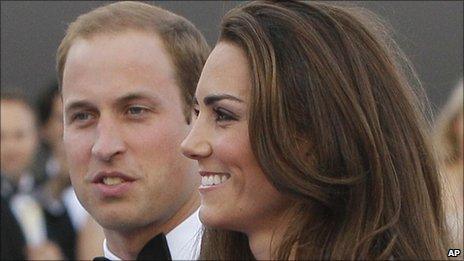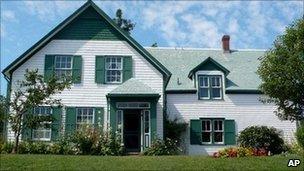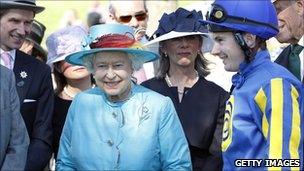Royal tour: Canada learns to love the monarchy
- Published
- comments

When the Duke and Duchess of Cambridge cross the Atlantic to celebrate Canada's birthday on Parliament Hill in Ottawa this week, it will be more than just a social call.
Not only is the first royal tour for the newlyweds a photo opportunity to die for - just think of all the different hats and dresses Kate will wear - for Canada, it's a matter of cultural identity.
While Canadians remain deeply divided on the issue of the monarchy, support for Crown rule appears to be gaining ground, thanks to what will be three royal tours in as many calendar years and a staunchly traditionalist Conservative prime minister, Stephen Harper.
When Charles and Camilla popped over for a visit in November 2009, loyalist crowds were embarrassingly thin on the ground. An Angus Reid poll conducted at the time found that two-thirds of Canadians wanted to see an elected home-grown head of state.
But just seven months later when the Queen came to stay, royal support had perked up. A record-breaking crowd of over 100,000 turned up to greet Her Maj on Parliament Hill - more than double the regular turnout.
Surveyed at the time, Canadians reported overwhelmingly positive feelings for the Queen and the number who felt the monarchy was outdated then dropped to just under half - not exactly a 21-gun salute, although we gave her one of those as well.
Monarchist agenda
Presumably the Palace learned its lesson: If Britain wants to strengthen Commonwealth bonds, send over your most charismatic royals. And it helps if they are extremely good-looking.

The couple will visit the setting for the children's book Anne of Green Gables
Now that Canada is the first to officially welcome Will and Kate, the nation is poised to return the love.
And what better choice of host could there be? Like the royal couple themselves, Canada is young, clean-cut, polite, uncontroversial and financially secure. A bit dull, perhaps, but we make up for it with upbeat small talk and unfailing good manners. It's an approach to life the Royal Family instinctively understands.
Last spring, Canadians got up in droves in the wee hours to watch the royal wedding - a reception that could only have validated Prime Minister Stephen Harper's own not-so-covert monarchist agenda.
In the past couple of years, his Tory government has re-introduced the crown to Canada Customs agents' badges, emphasised the swearing of allegiance to the Queen in the Oath of Citizenship and reportedly has plans to to tie together the bicentennial of the War of 1812 (in which Canada, as a colony, fought with British troops against the US) with the Queen's Diamond Jubilee next year.
When asked during last spring's election campaign whether he supported UK Deputy Prime Minister Nick Clegg's wish to abolish male primogeniture in the Royal Family (a move that would have serious constitutional ramifications for Canada), Mr Harper was dismissive.
"The successor to the throne is a man. The next successor to the throne is a man. I don't think Canadians want to open a debate on the monarchy or constitutional matters at this time. That's our position, and I just don't see that as a priority for Canadians right now at all."
Love story
Judging by the warm-to-slathering reception William and Kate have received from the Canadian media so far, the PM's instincts are right.
While Canadians might have strong opinions about the monarchy when polled, the Monarchist League of Canada estimates that in fact fewer than 0.6% of the population is actively engaged in the debate over the issue of republicanism.
The prevailing mood in parliament is, if it ain't broke, why fix it?
John Fraser, author of the forthcoming book The Secret Crown: Canada's Fling With Royalty, recently observed: "The idea of a Canadian monarchy, derived from our history and evolved through our federal and provincial offices of governor general and lieutenant governors, rests on a firm foundation of two sturdy and irrefutable facts: It exists and it works."

The Queen enjoyed a day at the races during her 2010 tour
Maclean's, a popular Canadian news magazine (for which Fraser and I occasionally write), has produced four special commemorative issues and a royal wedding book since the the royal couple announced their engagement late last year - that's over 500 glossy magazine pages devoted to a pair who live an ocean away.
Cathrin Bradbury, editor-in-chief of Maclean's Intelligence Unit, says Canadians can't get enough of the young royals.
"It's a love story - a happy, well-matched, stylish pairing of two great-looking young people with the future gleaming in their eyes," she said in an interview, adding that the fascination is not just about celebrity.
"Canadians, many Canadians, are proud and serious monarchists. It's part of who we are, and how we govern ourselves.
"And it's a very visible way that we are not American, and not being American is central to our identity. There are some who say the monarchy will survive longer in Canada than in Britain, and they might be right. William, King of Canada."
Prickly Quebec
Or perhaps King Harry instead, if you agree with Etienne Boisvert, the Quebec provincial spokesman for the Monarchist League of Canada, who this week told the press he thought William's younger brother ought to take up residence across the pond.
Being third in line to the throne, Prince Harry "has virtually no chance of becoming king and could set himself up here and found a Canadian branch of the Royal Family", Boisvert suggested.
It's an odd notion, especially coming from a Francophone Quebecker. While the monarchist love-in is expected to predominate in the rest of Canada, La Belle Province, as it is known, with its history of separatist tension, is the one place royal visitors can expect to feel some resistance.
A small crowd of 100 protesters disrupted the Prince of Wales' last tour in 2009, and it is expected the Duke and Duchess will be forced to keep calm and carry on through more of the same.
The Quebecois Network of Resistance has announced it will demonstrate at Quebec City Hall against the royal visit's cost to tax-payers (which, according to the Monarchist League of Canada, works out to only a few cents per citizen).
But William and Kate would be wise not to take such insults too personally.
The late separatist politician Rene Levesque once said, "I have great respect for the Queen... but what the hell part should monarchy have in Quebec?"
Until recently one could have said the same for the rest of the country. But once Kate and William have their way with us, I suspect Canada will be singing God Save the Queen.
Leah McLaren is a London-based columnist for The Globe and Mail newspaper.